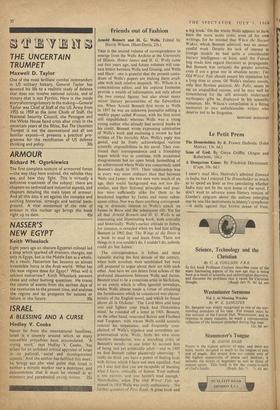Friends out of Fashion
THIS is the second volume of correspondence to emerge from the Wells Archive at the University of Illinois. Henry James and H. G. Wells came out two years ago, and future volumes will con- tain letters between Wells and Gissing, and Wells and Shaw: one is grateful that the present custo- dians of Wells's papers are making them avail- able with such relative despatch. Mr. Wilson is a conscientious editor, and his copious footnotes provide a wealth of information, not only about the two central figures. but also about many minor literary personalities of the Edwardian era. When Arnold Bennett first wrote to Wells in 1897 he was an unknown journalist editing a weekly paper called Woman, with his first novel still unpublished; whereas Wells was a rising young author who already had several books to his credit. Bennett wrote expressing admiration of Wells's work and enclosing a review he had written of The Invisible Man. Wells's reply was genial, and he freely acknowledged various scientific impossibilities in his novel. They con- tinued their correspondence and a friendship began which was to continue, with occasional disagreements but no open break (something of an achievement where Wells was concerned), until Bennett's death in 1931. Their relationship was in every way more ordinary than that between Wells and James: the two men were much of an age, their social background was not too dis- similar, and their fictional principles and prac- tice were sufficiently alike for them to be bracketed together by James and many subse- quent critics. Nor was there anything correspond- ing in dramatic interest to Wells's attack on James in Boon and the subsequent rift. Yet for all that Arnold Bennett and H. G. Wells is an interesting and illuminating book, both critically and historically. Wells's earlier attitude to James, for instance, is revealed when we find him telling Bennett in 1902 that 'The Wings of the Dove is a book to read in and learn from. There are things in it you couldn't do, I couldn't do, nobody could do but James.'
The correspondence is fullest and most valuable during the first decade of the century, when both novelists were established but were still prepared to argue about their art with each other. And here we can detect faint echoes of the profound dissensions between Wells and James. Bennett tried to be a conscious artist in his fiction, to an extent which is often ignored nowadays, whilst Wells almost made a virtue of emulating the formlessness which he considered was charac- teristic of the English novel, and which he found above all in Dickens: 'The Lord bless and keep you and lighten your black bad Dickensless mind,' he rounded off a letter in 1901. Bennett, on the other hand, venerated Balzac and Flaubert and Turgenev, with whom Wells could scarcely conceal his impatience, and frequently com- plained of Wells's slipshod and sometimes un- grammatical style. Wells, from his own more intuitive standpoint, was a searching critic of Bennett's novels—in one letter he accused him of being 'not yet artistically adult'—and in 1903 we find Bennett rather plaintively observing: 'I really do think you have a power of finding fault with fiction which I have not seen equalled. And yet I also feel that you are incapable of learning what I know, critically, of fiction. Your outlook is too narrow, and you haven't read enough.' Nevertheless, when The Old Wives' Tale ap- peared in 1908 Wells was justly enthusiastic : 'No further question of First Rank. A great book and a big book.' On the whole Wells appears to have been the more acute critic, even of his own writings, for he insisted that When the Sleeper Wakes, which Bennett admired, was an unsuc- cessful work. Despite his lack of interest in foreign models he had quite a considerable literary intelligence—at least, until the Fabian bug made him regard literature as propaganda. But Bennett was certainly the greater novelist, even if not a great one in absolute terms : The Old Wives' Tale should ensure his reputation for a long time to come. Of Wells's realistic novels, only that flawless pastoral. Mr. Polly, seems to me an unqualified success, and he may well he remembered for the still seriously underrated mythopceic gifts he displayed in his scientific romances. Mr. Wilson's compilation is a fitting memorial to two unfashionable writers who deserve not to be forgotten,
BERNARD BERGONZI


























































 Previous page
Previous page